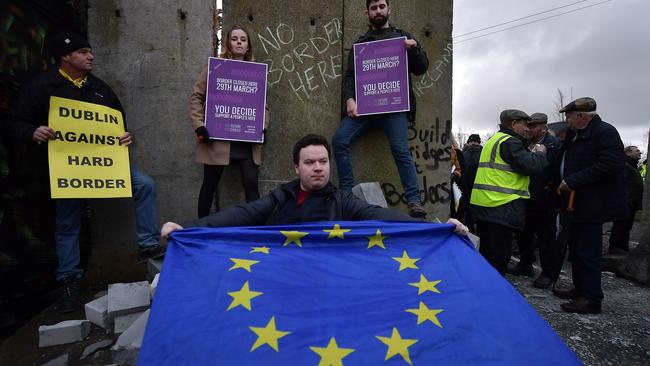Brexit: Theresa May’s Plan B in turmoil as rebels reject deal
Tory Brexiteers to vote down amendment to Theresa May’s Brexit Plan B that she hopes will help secure crucial concessions in the EU.

Conservative Brexiteers have vowed to defy Theresa May and vote down an amendment to her Brexit deal that she hopes will help her to secure crucial concessions in Europe.
The prime minister will whip Tory MPs to vote tomorrow morning (AEDT) for a demand to replace the Irish backstop with “alternative arrangements”.
Mrs May hopes that if she succeeds it will give her a mandate to wring concessions from Brussels over the most controversial element of the divorce deal. Allies admit, however, that she can only hope to reduce the scale of defeat from the historic loss inflicted two weeks ago, when her original deal was crushed by 230 votes.
She revealed her Plan B at a parliamentary party meeting last night after which Remain cabinet ministers accused her of “betting the house” in an attempt to court the hard-Brexit faction without prior consultation.
Failure could leave her fatally exposed to a cross-party move to take control of the Brexit timetable and prevent a no-deal exit on March 29, which is led by Labour’s Yvette Cooper and the Tory Nick Boles. The prime minister will attempt to drain support from Ms Cooper’s amendment by promising MPs they will have another chance to prevent such an exit by February 13. Without the threat of a no-deal Brexit, Mrs May will lose vital leverage in any discussions with Brussels.
For any chance of success, the prime minister will need a substantial number of former rebels to come into line tomorrow and back the amendment proposed by Sir Graham Brady, the senior Tory backbencher, if the Speaker allows a vote on it at all.
Last night she challenged the former foreign secretary Boris Johnson to support her so that he could “see what I’m going to do” with the mandate. Ominously, the hard-Brexit European Research Group (ERG) faction was refusing to rally behind calls for Tory unity while the Democratic Unionist Party was also withholding support.
Hard Brexiteers think Sir Graham’s amendment is too vague and will press Mrs May to commit to a wholescale renegotiation of the withdrawal agreement, something Brussels has repeatedly ruled out.
Mrs May’s allies say that the hardliners’ demands actually reveal their true goal of a no-deal Brexit.
Brussels dug in further against the expected demands to reopen talks, insisting that any efforts to place a time limit on the backstop, which guarantees no hard border in Ireland, were doomed. This has been mooted as one option that Mrs May might pursue as an alternative to her present backstop.
The prime minister’s fate will be determined in a series of votes from about 7pm Tuesdaya night local time (6am AEDT) at the conclusion of a six-and-a-half-hour debate. Mrs May will close the debate.
John Bercow, the Speaker, will rule on which amendments are put, and in which order, before the debate. If he selects the amendment and it goes down to a heavy defeat, Mrs May could struggle to convince MPs not to take control of Brexit by backing the Cooper amendment. Despite last-minute prevarication, Labour will support the move that could effectively sideline Mrs May.
Brussels delivered an uncompromising rejection of any effort to reopen negotiations. Sabine Weyand, the EU’s deputy negotiator, mocked the move as “Groundhog Day” and said Mrs May’s secretive style had allowed unrealistic Brexiteer demands to go unchallenged. Ms Weyand rejected the claim by Brexiteers that technology could ensure that there was no need for a hard border. “We looked at every border on this earth, every border the EU has with a third country - there’s simply no way you can do away with checks and controls,” she said.
She added that the clock was ticking and the focus on the backstop could lead to a no-deal Brexit by accident when time runs out for negotiations on March 29. “There’s a very high risk of a crash out not by design, but by accident. Perhaps by the design of Article 50, but not by policymakers,” she said. Raising the bar for Mrs May, the German negotiator pointed out that the prime minister would have to construct a “stable majority” of support in parliament in order for any deal to be ratified.
“That’s quite a big challenge. There’s no negotiation between the UK and EU - that’s finished. There’s no point beating about the bush: the agreement was defeated with a two-thirds majority in the House of Commons. That’s a crushing defeat by any standards. It’s quite a challenge to see how you can construct out of the diversity of opposition a positive majority for a deal.”
The Times


